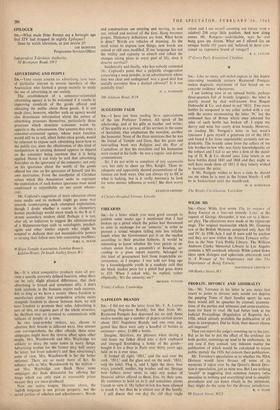PROBATE, DIVORCE AND ADMIRALTY SIR,—Mr. Torrance in his letter to
you states that resort to juries in divorce suits would not deprive the peeping Toms of their Sunday sport; he says there would still be speeches by counsel, examina- tions of the parties and witnesses and cross-examina- tions for them to read. He had better look at the Judicial Proceedings (Regulation of Reports) Act, 1926, which already prohibits the publication of all these in newspapers. Did he think their decent silence self-imposed?
They can report the judge's summing-up to the jury. But as he has to put the effect of the evidence for both parties, summings-up tend to be undramatic. In any case if they contain 'any indecent matter the publication of which would be calculated to injure public morals' the 1926 Act censors their publication.
Mr. Torrance's speculation as to whether the PDA Division would have thrown off some of its mysteries if taken over by the Queen's Bench Divi- sion is speculation, just as mine was. But I see nothing 'invalid' in suggesting that common lawyers (who specialise in nothing and everything) tend to simplify procedures and cut down rituals to the minimum; they might do the same for the divorce jurisdiction.
99 Gower Street, WC1
R. A. CLINE

































 Previous page
Previous page